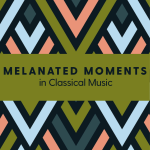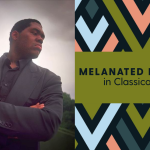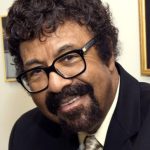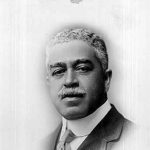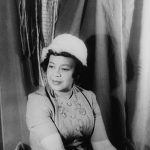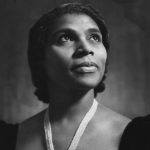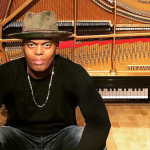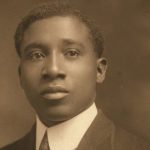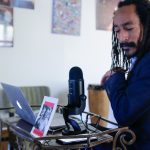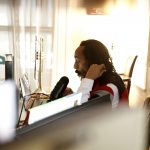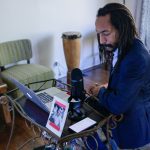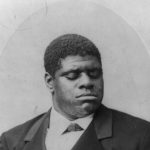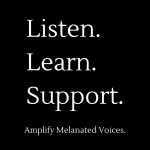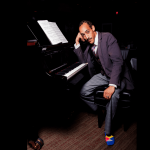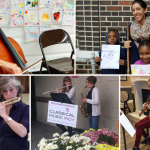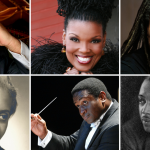MMCM S3E2: The Architect of American Music – Harry T. Burleigh
Joshua and Angela discuss the pioneering work of Harry Burleigh and how he directly influenced the sound of American music and paved the way into the traditional classical music space for the Black artists and composers who followed him. We are introduced to one of Burleigh’s non-choral works, Southland Sketches for violin and piano, and a rare recording of Burleigh singing Go Down, Moses.
Featured Music:
“Southland Sketches,” performed by Harry T. Burleigh
“Go Down, Moses,” performed by Harry T. Burleigh, recorded in 1919
Joshua Thompson (00:00): Before we get started with this episode, we wanted to thank everyone for your amazing support of this podcast. As our podcast community grows, we have added resources for each episode. So just visit our website to access blog posts and transcripts for each episode, or follow us on social media and email us anytime with your podcast suggestions to [email protected]. Angela Brown (00:43): Hello everyone and welcome back to Melanated Moments in Classical Music. I’m Angela Brown. Joshua Thompson (00:50): And I’m Joshua Thompson, back once again, to highlight, illuminate, and share the magic that is melanated music within and across the classical genre. Angela Brown (01:02): Joshua, I’m really excited for this episode because we’re going to be discussing a man who quite literally, and almost single-handedly created a unique style of music that would launch the careers of some of the most prolific musicians and vocalists we all know and love. Joshua Thompson (01:20): You are right, and for that reason, we’ve titled this episode, “The Architect of American Music,” because this gentleman is credited with developing American music and bringing it from the cotton fields and the churches all the way to prestigious performance halls all over the world. Angela Brown (01:41): Well, does this musical innovator have a name or what, honey? Unison (01:46): [Laughter] Joshua Thompson (01:47): Of course he does, indeed, and it’s quite the household name too. We’re talking today about Harry T. Burleigh. Angela Brown (01:55): Well, of course! This man was incredible. You honestly cannot talk about spirituals, art songs, or American music without putting him at the top of the list. Joshua Thompson (02:05): Absolutely. And there are so many pieces we could explore and even more about his life that we could dig into, but we only have so much time. So let me give you a quick rundown shall I? Angela Brown (02:17): Okay, let’s do that. Joshua Thompson (02:19): Alrighty. Harry Thacker Burleigh was born December 2nd, 1866 and died September 12th, 1949. He was a classical composer, arranger and professional baritone singer. You know, he’s credited as the first Black composer who was instrumental in developing American music characterized in folk songs, spirituals, field songs, and art songs and making it available to classical artists by arranging these styles in the classical tradition. Burleigh’s grandfather, who was known for his exceptionally melodious voice, taught a young Harry Burleigh and his brother, Reginald, traditional spirituals and slaves songs from their culture. Burleigh studied voice with George F. Brierley and during and after his high school years became known as one of the region’s most accomplished classical singers. He was accepted with scholarship, mind you, to the prestigious national conservatory of music in New York at the age of 26. And it’s there that he’s introduced with Antonín Dvořák and he introduces Dvořák to Black American music. Angela Brown (03:31): Wow! Joshua Thompson (03:31): Yeah! And we all know Dvořák like loved his stuff. And so it’s some of his most famous compositions have a lot of Harry Burleigh in it, And Dvořák said, and he called it right, that Black music would be the basis of American music in the future. Angela Brown (03:49): Well, it is American music, it was created here. Joshua Thompson (03:52): That’s what I’m saying. So, in 1893, Burleigh assisted Dvořák in copying out the instrumental parts for his new world symphony. In 1896, he graduates and he later serves on the National Conservatory of Music’s faculty. In 1894, Burleigh becomes a soloist for St. George’s Episcopal Church in New York City. Now some of the parishioners opposed hiring Burleigh at the time, because… Just take a guess, why do you think? Angela Brown (04:23): Him Black. Joshua Thompson (04:25): There we go. See, that’s why we have the show, right? It’s an all White congregation. And because of his race at the time, you know, other White, New York Episcopal Churches were forbidding Black people to worship until JPMorgan, as in JPMorgan Chase, was a member of St. George’s and he was the one who cast the deciding vote to hire for Burleigh. He has this position for the rest of his life, pretty much, you know, for like 52 years until he retires in 1946. He sang before King Edward the Seventh in London and 1908 and did so many other prestigious concerts around Europe and his art song arrangements of these spirituals were so popular during the 1910s and 1920s that almost no vocal recitalist gave a concert in a major city without singing them because there’s an estimated 200-300 of these arrangements. So, you know what I find to be really, really cool. And we’ll circle back to this one is, Harry Burleigh was one of the founding members of ASCAP and became a board member of the organization in 1941. And then he passes away at the age of 82 from heart failure. Angela Brown (05:45): What A life? I mean, I love what we’re at- featuring Harry Burleigh this season, because it’s yet another link to Season Two, discussing spirituals, Moses Hogan, Dr. McCorvey, and to some extent Robert Nathaniel Dett. Joshua Thompson (06:01): Oh, for sure. And I think it’s a constant reminder to all of us of how contemporaries wield so much influence on the works and the study of future generations, whether they are aware of it or not. And I think that’s pretty cool. Angela Brown (06:16): Joshua, can we hear a little of Burleigh’s non choral works? I mean, he’s so well known for his choral arrangements that his instrumental compositions often get overlooked. Joshua Thompson (06:26): We sure can. And we’re definitely going to circle back to the influence of his choral works and the influence they had on careers and opera that I know you know. So today what we’re going to do, actually I play his only solo piano work, which is “From the Southland.” But today we’re going to listen to two movements from an equally fantastic set for violin and piano. And might I add, for music teachers out there and for young violinists who are looking for accessible music to program on your recital, check out his 1916 composition “Southland Sketches.” Angela Brown (07:02): Okay, but now is there anything we should be listening for in the movement you’ve selected? Joshua Thompson (07:08): Yeah, but these are short movements. And so for right now, I really just want folks to sit back and absorb what they hear and then we’ll discuss afterwards. Angela Brown (07:17): That works for me, honey, hit it, boo. Music Plays (08:55): [Harry T. Burleigh, “Southland Sketches”] Angela Brown (12:46): Joshua, that was so pleasant and relaxing. Joshua Thompson (12:49): Absolutely. I like it too. It does remind me of a little bit of Robert Nathaniel Dett. Angela Brown (12:54): Uh huh. Joshua Thompson (12:54): Remember, he’s doing his “In The Bottoms Suite.” It’s totally Southern, or country and it’s just very simple. It is. It’s just very simple and straightforward. Angela Brown (13:04): You know, you don’t always need a whole lot of window dressing on something to get your point across. And I can totally hear how Burleigh takes folk stylings and works them into the classical tradition. It’s all about the violin doing its best to mimic that lilt and that twang of the fiddle player. Joshua Thompson (13:24): Bingo. Right, ’cause these are the folks hes hanging out with when he gets done with his job. Right. This is what they play. It’s that ambling rhythm that stays constant throughout. So, yeah, the last movement does more of the same, but he puts a little bit more of a bounce and a little wiggle in it. Angela Brown (13:42): Love it, all of it! Thank you for that brief peek into this part of his vast catalog. I’m supposed to remind you to talk about Burleigh and opera stuff now? Don’t be holdin’ out. Joshua Thompson (13:57): Yes, how could I forget? So, Burleigh is definitely changing and expanding the musical landscape during this time. But what I find empowering is how he’s, you know, lightweight or actually heavyweight, paving the way for Black operatic singers at the turn of the 20th century. And there’s one of them I know, you know, very well. Angela Brown (14:19): I sure do. Who could forget the accidental activists from Season Two, Marian Anderson. Joshua Thompson (14:27): That’s the one and I’m gonna throw Paul Robeson in there too. Burleigh programmed spirituals and art songs so well that they became standard repertoire for the time. And that’s so important because really this is the first time that Black people finally have a way into the professional classical circuit. So Bravo and thank you, Mr. Burleigh. Angela Brown (14:53): Well, bravo, indeed. Before we sign off, I see that you’ve gotten a hidden treasure of sorts. Uh, what is it? Joshua Thompson (15:02): Well, listen, you know, me always full of surprises. We’re going to leave you all today with one of the only surviving recordings of Harry Burleigh himself. It was recorded in 1919, which by the way, Burleigh hated the recording process. It was new and he wasn’t a fan. Angela Brown (15:23): [Laughter] I understand that as a singer myself. Joshua Thompson (15:25): I know you do. And by all accounts, he also wasn’t all that thrilled with his performance in this. Angela Brown (15:33): Well, you know, I’m sure that he did better than he thought. Joshua Thompson (15:39): That’s what I think too. So at any rate, I think it’s all the more incredible to hear it, given the context and the background that we’ve provided today. So without further ado, the myth, the man, the legend himself, Mr. Harry Thacker Burleigh singing, “Go Down Moses.” Music Plays (16:05): [Harry T. Burleigh performing “Go Down Moses”] Angela Brown (17:46): Joshua, I got to say this was a great feature. I mean, seriously groundbreaking and the stuff legacies are made of. Joshua Thompson (17:56): Listen, Harry’s dope. He’s dope. So in keeping with that spirit of dopeness, I’m Joshua Thompson. Angela Brown (18:02): [Laughter] And I’m Angela Brown, Unison (18:04): And this has been Melanated Moments in Classical Music. Angela Brown (18:13): Melanated Moments in Classical Music is a production of Classical Music Indy. Our producer is Ezra Bakker Trupiano. Season Three production assistants are Okara Imani and Samantha Hoyer. Our theme music was composed by Laura Karpman. Joshua Thompson (18:32): Season Three of Melanated Moments in Classical Music was made possible in part by Jim and Sara Lootens. We thank them for their generous support. Angela Brown (18:41): As a fan of this award winning podcast, we need your help today to create future episodes. You can make Season Four, a reality by texting “MMCM” to (202) 858-1233. Your support includes exclusive content playlists and other perks to thank you for helping us share the stories of even more exceptional Black artists on the podcast. Our podcast partners are the Black Podcasting Awards and Morning Brown, Inc. Joshua Thompson (19:18): And finally, if you’d like to join us in the celebration of the Black experience in the world of podcasting, check out our friends at the Black Podcasting Awards website.
LOCAL CLASSICAL – MELANATED MOMENTS SEASON SIX
As we continue celebrating Black Music Month, this week’s playlist will feature music and artists discussed during the latest season of Melanated Moments in Classical Music. All of season six was recently released and featured vibrant discussions about artists such as Scott Joplin, Hazel Scott, Joseph Bologne, and Kenneth Overton, among others.
LOCAL CLASSICAL – BLACK MUSIC MONTH
In this week’s playlist, we celebrate Black Music Month which takes place in June. It was created by President Jimmy Carter in 1979 to honor and celebrate Black artists’ contributions to music. We’ll be honoring the late Herman Whitfield III, an Indianapolis native who was a gifted pianist and composer. We’ll also hear performances of artists who have been featured in season four of Classical Music Indy’s podcast, Melanated Moments in Classical Music.
LOCAL CLASSICAL – MELANATED MOMENTS
In this week’s Black History Month playlist, we bring you recordings by composers, performers, and artists who have been highlighted in our podcast, Melanated Moments in Classical Music. Melanated Moments is the ward-winning podcast from Classical Music Indy that shines a spotlight on musical works composed by, for, and about Black people.
LOCAL CLASSICAL – HOST OKARA IMANI
Hey, Starshine! This is Okara Imani, Media Production Fellow for Classical Music Indy, and your guide to The “I” in Classical Music. I’m here to highlight the cultural and social intersections of the classical art form, beyond the Classical Period and beyond the constructs of Euro-centric high society origins.
Ric’key Pageot: Inspiring a Moment to Learn, Acknowledge, and Respect
Ric’key Pageot: Inspiring a Mo …
Ignatius Sancho: Composing the Hypocrisy of Colonialism & Convention
Ignatius Sancho: Composing the …
NEW CLASSICAL – DR. BILL BANFIELD
This week we bring you the music of Dr. Bill Banfield. Dr. Banfield is an award-winning composer whose symphonies, operas, chamber works have been performed and recorded by major symphonies across the country. Few have a wider, performed professional composing output, that has had public concert performances, reviews, radio, recordings of some 12 symphonies, 7 opera, 9 concerti, chamber, jazz, and popular forms. This alone making Dr. Banfield one of the most performed, recorded composers of his generation. In 2010 and 2016, Dr. Banfield served as a Pulitzer Prize judge in American music.
#AmplifyMelanatedVoices
Classical Music Indy stands with our Black community. We are here to listen, learn, and lend our support. We believe that classical music is powerful; that it evokes a range of human emotions and creative expression.
Angela Brown Brings her Unbridled Zeal to a New Podcast.
Angela Brown brings her unbrid …
Local Classical – Angela Brown
We continue our Black History Month programming this week with our featured artist, soprano Angela Brown. Born in Indianapolis, Brown has led a world-renowned career as a vocal soloist. Her highly successful Metropolitan Opera debut in the title role of Aida captured instant attention from international print and broadcast media and catapulted Angela onto the world’s prestigious opera and symphonic stages.
Highlighting our Female Performers
Classical Music Indy employs a diverse range of musicians for our events around Indianapolis. In 2016 we hired 95 musicians. Classical Music Indy has dedicated our blog articles to outstanding women musicians this month. We’ve shared about great women music educators in America and about under-recognized women musicians throughout history. This week, we take a look at a few of Classical Music Indy’s top performers – women who are doing great work here and now in the city of Indianapolis. Read below about these incredibly talented musicians, and hopefully you’ll hear them at one of our events in the near future!

